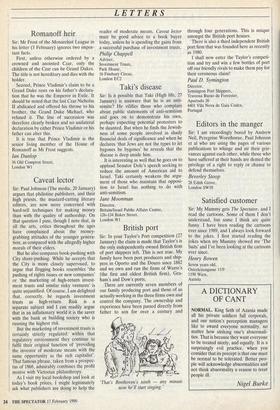Caveat lector
Sir: Paul Johnson (The media, 20 January) argues that philistine publishers, and their high priests, the mustard-cutting literary editors, are now more concerned with hard-sell techniques for making money than with the quality of authorship. On that question I pass, though I note that, in all the arts, critics throughout the ages have complained about the money- grabbing attitudes of the younger genera- tion, as compared with the allegedly higher morals of their elders.
But he also compares book-pushing with City share-pushing. While he accepts that the City is more closely supervised, to argue that flogging books resembles 'the pushing of rights issues or new companies' or 'the marketing of high-return invest- ment trusts and similar risky ventures' is quite unjustified. Of course, I am delighted that, correctly, he regards investment trusts as high-return. Risk is a separate subject and I can readily argue that in an inflationary world it is the saver with the bank or building society who is running the highest risk.
But the marketing of investment trusts is certainly strictly regulated: within that regulatory environment they continue to fulfil their original function of 'providing the investor of moderate means with the same opportunity as the rich capitalist'. That famous phrase, taken from a prospec- tus of 1868, admirably combines the profit motive with Victorian philanthropy.
As I visit my local bookshop and look at today's book prices, I might legitimately ask what publishers are doing to help the reader of moderate means. Caveat lector must be good advice to a book buyer today, unless he is spending the gains from a successful purchase of investment trusts.
Philip Chappell
Adviser, Investment Trusts, Park House, 16 Finsbury Circus, London EC2


















































 Previous page
Previous page